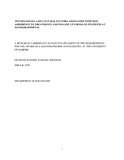| dc.description.abstract | Introduction; Non adherence is a major obstacle in delivery of healthcare services, because
even the best medicine is not effective unless taken appropriately. According to WHO only
about 50% of patients are compliant on treatment.
This study aimed at identifying the psychosocial and cultural factors that may be associated
with nonadherence of outpatients on follow up at Mathari hospital
Methodology;This was a crosssectional descriptive survey . Data was collected using a
structured questionare and focussed group discussions. Quantitative data was analyzed using
SPSS version 17. Qualitative data was summarized in narratives.
Results: A total of 347 patients were conveniently sampled for face to face interview, and 4
focussed group discussions were held between July and December 2012. 57% were male and
43% female.The mean age was 36.8 years.The mean duration of illness was 9 years . 33.7% (n
=117) reported missing medication since the previous visit, and 22.5% (n=78 ) missed a clinic
in the previous one year. Nonadherence was associated with: not knowing the illness one
suffered from ( p 0.013), not knowing the names of the drugs one was taking ( p value 0.030) ,
feeling the medication was not helpful, ( p =0.002), feeling better hence no need for medication
(p = 0.001), carelessness as a reason for missing medication ( p value<0.0001), feeling one had
used medication for too long and needed a break (p=0.026), unreliable source of information on
the drugs and illness (p=0.0001), viewing the illness as different from other illness (P 0.048),
fear that people will know about the mental illness (p =0.001) , discomfort with sharing about
ones feelings with others (p=0.002), preference of herbal medication (P=0.004), high cost of
drugs (p<0.0001) and feeling worse on taking medication( p=0.001). From the discussion
groups, lack of awareness about medication featured strongly as a reason for missed medication.
Conclusion: Negative attitudes towards medication, lack of awareness, stigma , poor social
support, use herbal medication ,high cost of medication and drug adverse effects are associated
with non adherence. These factors need to be addressed at individual and institutional level in
order to optimize the quality of care of the mentally ill. Psychoeducation programmes for
patients and the community need to be emphasized in order to reduce these obstacles. | en |
| dc.description.department | a
Department of Psychiatry, University of Nairobi, ; bDepartment of Mental Health, School of Medicine,
Moi University, Eldoret, Kenya | |

